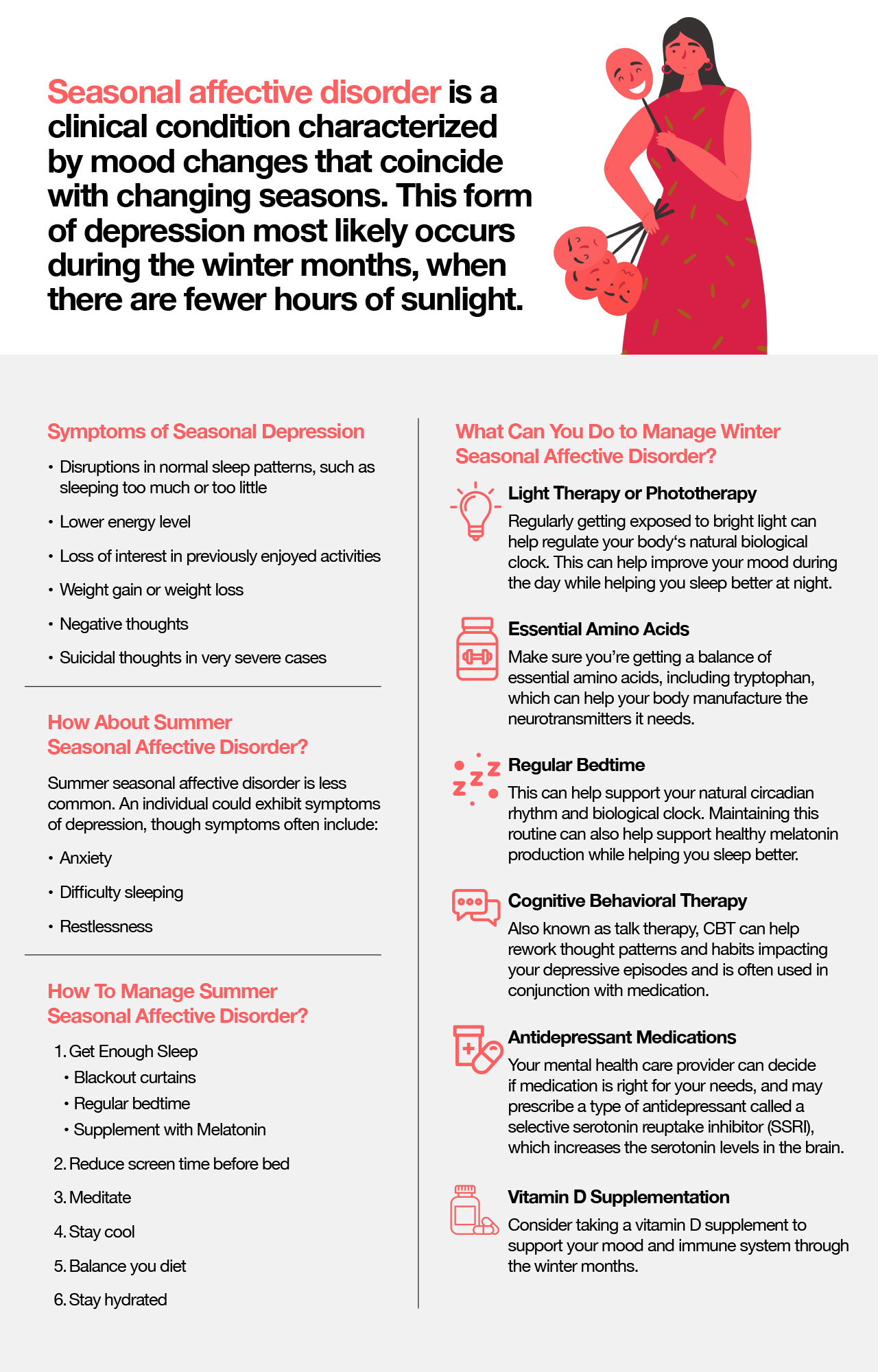When winter rolls around, many of us may find ourselves feeling a little more down than usual. Though it’s normal to have “off days,” seasonal depression may be the culprit if you find yourself feeling down for longer than just a day or two. Here we go through the causes and symptoms of seasonal depression. We also discuss strategies for managing seasonal depression, so you can feel your best during the winter months.
What You Need to Know About Seasonal Depression
The National Institute of Mental Health explains that seasonal affective disorder is classified as a form of depression. (1) Seasonal depression describes a change in mood that usually coincides with the winter months, and is often referred to as winter depression. It is clinically referred to as seasonal affective disorder (SAD).
Keep in mind that SAD can refer to mood changes occurring during any season change. For example, depression occurring during the summer months is often referred to as summer depression. However, in this article, we specifically discuss seasonal depression that commonly occurs during the winter months.
Symptoms of Seasonal Depression
SAD symptoms can mimic those associated with major depressive disorder, and are usually experienced during late fall and winter. Here are a few symptoms of winter depression that one may experience:
- Low energy
- Loss of interest in activities you usually find enjoyable
- Mood changes
- Pervasive and daily feelings of depression
- Negative thoughts
- Difficulty concentrating
- Trouble sleeping
- Weight loss or weight gain
- Changes in appetite
- Overeating or undereating
Causes of Seasonal Depression During Winter Months
There are many possible causes of seasonal depression. First of all, many people may be susceptible to seasonal changes because of the decreasing number of hours of light during winter months. This is especially true in very Northern areas like Alaska, where some parts of the state don’t see the sun at all during the winter months.
There are also other risk factors that can be associated with seasonal depression.
What You Can Do to Combat Seasonal Depression
Seasonal depression, like major depression, can negatively impact your quality of life and day-to-day functioning. Thankfully, there are things you can do to manage seasonal depression.
1. Light Therapy
Light therapy or phototherapy can be a helpful component of your management plan for seasonal depression, especially in areas of the world where there are very few hours of sunlight during the winter.
You can purchase a light box to position in your living or working area, to increase your exposure to ultraviolet light. Light boxes are designed to replicate natural light from the sun. Our eyes and brains are programmed to react to exposure to outdoor light in a way that balances our circadian rhythm and enhances mood. Replacing the lost daylight with artificial light during the winter months is an effective strategy for preventing and managing seasonal depression.
2. Melatonin
Melatonin is a hormone that the body naturally produces to induce sleepiness in the evening hours after the sun goes down. Taking a little bit of melatonin in the evening may help you sleep more soundly while also helping to regulate your internal clock.
3. Maintaining a Regular Sleep Schedule
When warding off the winter blues, it’s a good idea to maintain a regular sleep schedule. Aim to go to bed and wake up around the same time each day. Keeping this habit helps the body maintain its biological clock.
4. Cognitive Behavioral Therapy
Cognitive behavioral therapy – also known as CBT – is a form of psychotherapy or talk therapy that is often a helpful strategy for managing mental health issues. Regularly seeing a cognitive behavioral therapist can help you adapt thought patterns and behavioral habits in a way that combats depressive symptoms.
5. Maintaining a Balanced Diet
Eating a balanced diet can help nourish your body and brain with the nutrients they need to function optimally. Enjoying foods from all food groups is a crucial part of managing seasonal depression. Fruits and veggies offer vitamins, minerals, and antioxidants that support immune system health and lower inflammation. Whole grains and beans are rich in complex carbohydrates that provide energy and fiber that improves gut health and cardiovascular health. Nuts, seeds, and fatty fish are high in healthy fats that support brain health and immune health. Proteins like lean meat and dairy offer amino acids that support nearly all biological functions, from muscle synthesis to neurotransmitter production.
6. Essential Amino Acid Supplementation
Essential amino acid supplementation may be helpful in managing the symptoms of seasonal affective disorder. Essential amino acids are obtained from the foods we eat and are required by the body to produce neurotransmitters, hormones, muscle tissue, and enzymes.
Research published in Reviews in Neuroscience suggests that tryptophan may be an effective strategy for combating seasonal affective disorder, especially in combination with light therapy. (2)
Tryptophan is a critical precursor to the neurotransmitter serotonin, lower levels of which are implicated in the development of depression and seasonal affective disorder.
Beyond just tryptophan, research has also found fluctuations in tryptophan levels throughout the year. In a study published in Archives of General Psychiatry, researchers found significant changes in L-tryptophan as well as leucine, phenylalanine, and valine over the course of the year. (3) Higher tryptophan levels were observed in spring, in comparison to other seasons. (3) Taking optimal ratios of essential amino acids in supplement form may help balance out all essential amino acid levels.
It’s important to note that taking a tryptophan supplement alone may not be the best solution, since taking one essential amino acid can throw off the balance of the others. Instead, a high-quality supplement offering optimal ratios of essential amino acids is best for your overall health and well-being.
7. Vitamin D Supplementation
Seasonal affective disorder may also be linked to vitamin D deficiency. Vitamin D is a critical fat-soluble vitamin that is present in very few foods. Humans synthesize the majority of their vitamin D from exposure to the sun. Having sufficient levels of vitamin D is important for healthy bones, immune system function, and brain health. During winter months, we naturally get less sunlight, and produce lower levels of vitamin D.
Vitamin D is involved in so many biological processes, and most people in the United States have insufficient or deficient levels of the vitamin. Incorporating a vitamin D supplement into your routine could increase your vitamin D levels and help protect your mental health.
8. Exercise
Regular physical activity is an integral part of a management plan for seasonal depression. A study published in Frontiers and Psychology investigated the impact of exercise on 129 individuals with mental health disorders. (4) Results revealed that exercise was linked to improvements in measures of attention, mood, and tiredness. (4)
Keep in mind that you don’t need to do a 2-hour workout to enjoy the mood-boosting benefits of exercise. Try engaging in 20-30 minutes of cardio each day, through activities like walking, biking, hiking, jogging, or dancing.
9. Medication
Antidepressant medication is a very effective treatment option in the management of seasonal depression. A psychiatrist will be able to evaluate your symptoms and decide if medication is a good option for your specific case of seasonal depression.
A class of antidepressants called selective serotonin reuptake inhibitors (SSRIs) are often used for treating depression, including seasonal affective disorder. SSRIs work by increasing the brain chemical serotonin, which helps to improve mood. Keep in mind that antidepressants or any medication may come with side effects.
Visit Your Doctor
If you’re exhibiting symptoms of seasonal depression, it’s important to book an appointment with your doctor or healthcare provider. Your physician will be able to evaluate your symptoms and refer you to mental health professionals, such as a specialist in psychiatry. It’s also a good idea to check in with your doctor before starting any new supplements, to ensure that the supplements you’re taking work best for your specific health needs.
If you are having thoughts of suicide, it’s important to seek medical attention immediately. The National Suicide Prevention Lifeline is a network of crisis centers that offers free emotional support for individuals experiencing a mental health crisis.
Other Things to Keep in Mind
In many cases, there’s not just one strategy that works. Try out different combinations of management strategies to see what works best for you.
Conclusion: What You Can Do About Seasonal Depression
All types of depression are serious mental health issues that take a toll on well-being and quality of life. Seasonal depression or seasonal affective disorder is a form of depression that is triggered by the change in seasons, occurring most commonly between summer and winter. Light therapy, a balanced diet, vitamin D, essential amino acid supplements, regular exercise, and medication are examples of strategies that play a role in managing seasonal depression. If you think you might be suffering from seasonal depression, it’s important to get in touch with your doctor.

References:
(1) https://www.nimh.nih.gov/health/publications/seasonal-affective-disorder
(2) https://pubmed.ncbi.nlm.nih.gov/26167977/
(3) https://pubmed.ncbi.nlm.nih.gov/7487342/
(4) https://www.frontiersin.org/articles/10.3389/fpsyg.2018.00249/full


















